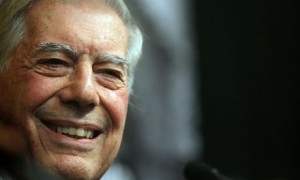
Yesterday, it was finally announced: Mario Vargas Llosa just won the Nobel Prize for Literature. At last, victory for Peru! Victory for Latin American literature!
But then my regret set in. Vargas Llosa is an excellent writer; he is the prolific author of novels, stories, and essays, which are considered the pinnacle of Peruvian literature and essential documents witnessing the country’s experiences of dictatorship. My personal favorite: Aunt Julia and the Scriptwriter (destroyed in a movie adaptation by Keanu Reeves. Is nothing sacred??). But he has never taken the sublime experimental risks of Mexican author Carlos Fuentes, who has yet to be laureled (and, let’s face it, he probably doesn’t have a lot of time left. Sniff).
In fact, the prize committee has scrupulously kept the award away from this hemisphere for years — Toni Morrison was the last American (North or South) to win back in 1993. So if the committee is finally setting its sights back West, why snob Fuentes yet again?
And furthermore, as much as I adore Vargas Llosa’s writing, I often raise a skeptical eyebrow at his politics. While his anti-dictatorship writings are to be lauded, as his position on human rights issues, he ran for president of Peru back in 1990 on a pro-Neoliberal, conservative Right platform, and more recently had thrown his support behind George W. Bush. Enough said. Perhaps these very politics are at the root of his famous shared enmity with fellow Laureate Gabriel Garcia Marquez; the two famously came to blows over their differences back in the 70s. The Philadelphia Inquirer reported that on hearing the news, Marquez tweeted (how adorably awesome is it that he tweets??): “We’re even.”
Latin Americanists have been collectively murmuring their approbation in the blogosphere since the announcement, but for each person who says it’s about time Llosa won, there’s another who indignantly insists so-and-so was wronged by the Committee (um, as I just did, I guess). Many are lamenting the loss of favored to win (and surely deserving of the prize) Kenyan author Ngugi wa Thiong’o, whose novels, including A Grain of Wheat, are masterpieces of literature whether or not the qualifier “post-colonial” is attached, and whose decision to renounce writing in English in favor of his native Gikuyu was bold, risky and exciting.
I’m just relieved the committee didn’t go for another random author whose works bore me to tears (can ANYONE explain the choice of Le Clezio to me back in 2008??), nor did they cater to the oft-voiced and capricious demands of certain parties who believe that authors like Michel Houellebecq should win (here’s a hint: he shouldn’t. Ever. Or I will personally put his books in a blender and drink them).
And I’m thrilled that a Latin American is in the spotlight once again. If you aren’t up on the Boom lit. of the 60s and the 70s (Marquez, Fuentes, Llosa, Neruda, and of course, the SUBLIME Julio Cortazar) then go read it. It is some of the best writing in the entire history of the world.
–Ania Szremski, Arts Editor








So the Nobel committee should award ‘their’ prize to the author the public and interested stakeholders clamor? Your article is so ambivalent and confusing, it makes me wonder what your politics are. Okay, you dislike Vargas Llosa’s politics; so, writers should check with you first?
Perhaps you did agree with Heidegger’s politics.